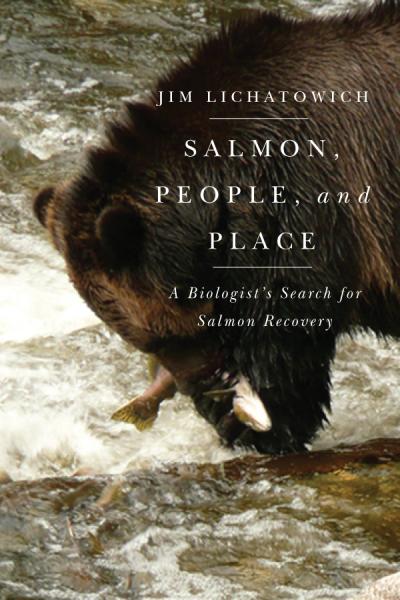Recently, Jim Lichatowich, whose most recent book, Salmon, People, and Place: A Biologist’s Search for Salmon Recovery is out from the OSU Press, paid a visit to Oregon State to deliver a talk: “Salmon Management and Salmon Science at a Crossroads” as part of the department of Fisheries and Wildlife’s seminar series.
Lichatowich spoke openly with young biologists about his experiences over the course of his esteemed career—including the ethical dilemmas between policy and science he says are endemic to the profession. He challenges would-be wildlife managers to consider what they themselves will do, when faced with one such dilemma of their own.
Today, Jim Lichatowich returns to OSU as a guest blogger to offer his advice in writing.
***
During my career, I worked nearly 20 years at the Oregon Department of Fish and Wildlife (ODFW). As chief of fisheries research at ODFW, I learned how difficult it was to get the new scientific information the researchers were developing incorporated into salmon management programs. After leaving ODFW, I served on ten independent scientific review panels, which were looking into various aspects of salmon management and recovery programs. Service on those panels also showed me that there are impediments to the incorporation of science into salmon management and recovery programs.
One of the scientific panels I served on was the Independent Scientific Advisory Board for the Columbia River Fish and Wildlife Restoration Program. Another panel scientist, Rick Williams, and I summed up part of our combined 20 plus years on the panel in this paper: Failures to Incorporate Science Into Fishery Management and Recovery Programs: Lessons from the Columbia River. We identified three impediments: 1) a conceptual foundation that is not consistent with the latest science, 2) the fragmented way watersheds are managed and, 3) political interference. Recently, I added a fourth impediment: a lack of historical perspective.
 In my book Salmon, People, and Place: A Biologist’s Search for Salmon Recovery, I discuss several examples of the gap between what science is telling us and what management is actually doing. This gap is an impediment to the success of salmon recovery programs and one of the reasons that the huge expenditure of recovery dollars has resulted in so little real progress. For students at OSU who are looking forward to a career in a fish and wildlife agency, the gap between science and management has another serious implication.
In my book Salmon, People, and Place: A Biologist’s Search for Salmon Recovery, I discuss several examples of the gap between what science is telling us and what management is actually doing. This gap is an impediment to the success of salmon recovery programs and one of the reasons that the huge expenditure of recovery dollars has resulted in so little real progress. For students at OSU who are looking forward to a career in a fish and wildlife agency, the gap between science and management has another serious implication.
During the 44 years of may career, I witnessed this gap create ethical dilemmas for young biologists. For example, do you follow a policy that you know to be a flawed or do you do what you believe is the right course, the course consistent with what science is telling us about salmon sustaining-ecosystems? It is an ethical dilemma that I have seen colleagues face too many times and have experienced myself.
If or when confronted with this ethical dilemma each biologist has to make an intensely personal decision based on his or her circumstances. No one can make it for you. The only advice I can give is this: take a little time now to think about what you might decide should you be faced with this dilemma, so you will be at least partially prepared to handle such a difficult situation.
--Jim Lichatowich
 Jim Lichatowich is the author of the award-winning Salmon without Rivers: A History of the Pacific Salmon Crisis, and Salmon, People, and Place: A Biologist’s Search for Salmon Recovery. He has worked on Pacific salmon issues as a researcher, manager, and scientific advisor for more than forty years. He has served for many years on the Independent Scientific Advisory Board for the Columbia River Salmon Restoration Program, the State of Oregon’s Independent Multidisciplinary Science Team, and on other independent scientific review panels in British Columbia and California. He lives in Columbia City, Oregon.
Jim Lichatowich is the author of the award-winning Salmon without Rivers: A History of the Pacific Salmon Crisis, and Salmon, People, and Place: A Biologist’s Search for Salmon Recovery. He has worked on Pacific salmon issues as a researcher, manager, and scientific advisor for more than forty years. He has served for many years on the Independent Scientific Advisory Board for the Columbia River Salmon Restoration Program, the State of Oregon’s Independent Multidisciplinary Science Team, and on other independent scientific review panels in British Columbia and California. He lives in Columbia City, Oregon.
Related Titles

Salmon, People, and Place
Each year wild Pacific salmon leave their oceanic feeding grounds and swim hundreds of miles back to their home rivers. The salmon’s annual return is...
